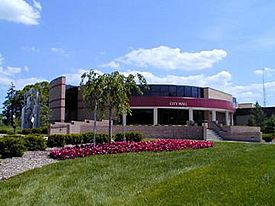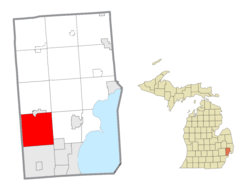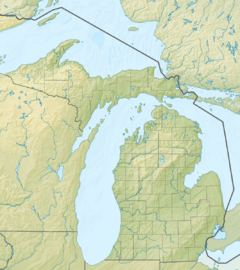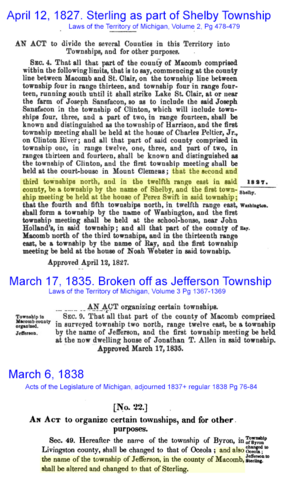Sterling Heights, Michigan facts for kids
Quick facts for kids
Sterling Heights, Michigan
|
||
|---|---|---|

Sterling Heights City Hall
|
||
|
||
| Motto(s):
To Strive on Behalf of All
|
||

Location within Macomb County
|
||
| Country | United States | |
| State | Michigan | |
| County | Macomb | |
| Incorporated | 1968 (city) | |
| Government | ||
| • Type | Council–manager | |
| Area | ||
| • Total | 36.72 sq mi (95.10 km2) | |
| • Land | 36.45 sq mi (94.40 km2) | |
| • Water | 0.27 sq mi (0.70 km2) | |
| Elevation | 614 ft (187 m) | |
| Population
(2020)
|
||
| • Total | 134,346 | |
| • Density | 3,686.06/sq mi (1,423.18/km2) | |
| Time zone | UTC−5 (Eastern (EST)) | |
| • Summer (DST) | UTC−4 (EDT) | |
| ZIP Codes |
48310, 48311, 48312, 48313, 48314
|
|
| Area code(s) | 586 | |
| FIPS code | 26-76460 | |
| GNIS feature ID | 0638798 | |
Sterling Heights is a city in Macomb County in the U.S. state of Michigan. A northern suburb of Detroit, Sterling Heights is located roughly 18 miles (29.0 km) north of downtown Detroit. As of the 2020 census, the city had a population of 134,346, placing Sterling Heights as the second-largest suburb of Detroit, and the fourth-most populous city in Michigan.
Contents
History
As a result of the War of 1812 and the 1817 Treaty of Fort Meigs, the area of the Michigan Territory which now makes up Sterling Heights was first surveyed by Deputy Surveyor Joseph Wampler; his survey was approved on February 20, 1818. Wampler had been one of two deputy surveyors of Perrysburg, Ohio, in 1816.
Originally created as part of Shelby Township in April 1827, it was broken off as Jefferson Township in March 1835. In March 1838, it was renamed Sterling Township.
Until the 1950s, Sterling Township was an agricultural area, largely devoted to growing rhubarb and other crops sold in Detroit. Road improvements led to decreased commute times and lower costs for the delivery of goods and services to and from businesses. The population increased when suburban homes were built for the workers in metropolitan Detroit's booming automobile industry. When Sterling Township was incorporated as a city in 1968, "Heights" was added to the name to satisfy a state law that prevents incorporated municipalities from having the same name, as there was already a small village named Sterling in Arenac County.
Gerald Donovan became the first mayor of the city and F. James Dunlop became the first mayor pro-tempore. In the 1960s and 1970s, many residents came to live in Sterling Heights to work in automobile plants operated by Chrysler and Ford. Lakeside Mall opened in Sterling Heights in 1976.
The city is home to many groups of immigrants. It has received many people of eastern European origins, including ethnic Albanians, Bosnians, Croatians, Macedonians, Montenegrins, Poles, Serbians and Slovenians. After the 2003 U.S.-Iraqi War, millions of Iraqi citizens were displaced, particularly Assyrians, whom the majority of which adhere to the Chaldean Catholic Church. Of these, 30,000-50,000 resettled in Sterling Heights, giving parts of the city the nickname "Little Nineveh", especially around 15 Mile Road and Ryan.
Geography
Sterling Heights is a second-ring suburb, 14 to 20 miles (23 to 32 km) north of downtown Detroit. The city's southern border is 6 miles (10 km) from Detroit's northern border. The shape of the city is six miles long and miles wide. It is bordered to the south by the city of Warren, at its southwest corner by Madison Heights, to the west by Troy, to the north by Utica and Shelby Township, at its northeast corner by Macomb Township, to the east by Clinton Township, and to the southeast by Fraser.
According to the U.S. Census Bureau, Sterling Heights has a total area of 36.72 square miles (95.10 km2), of which 36.45 square miles (94.41 km2) are land and 0.27 square miles (0.70 km2), or 0.74%, are water. The Clinton River crosses the northeast part of the city, flowing east to Lake St. Clair east of Mount Clemens.
Climate
Sterling Heights features a humid continental climate (Köppen: Dfa). Summers are somewhat hot with temperatures exceeding 90 °F (32 °C) on average 8.6 days. Winters are cold, with temperatures not rising above freezing on 39.1 days annually, while dropping to or below 0 °F (−18 °C) on average 1.2 days a year.
| Climate data for Sterling Heights (Eastpointe station) | |||||||||||||
|---|---|---|---|---|---|---|---|---|---|---|---|---|---|
| Month | Jan | Feb | Mar | Apr | May | Jun | Jul | Aug | Sep | Oct | Nov | Dec | Year |
| Mean daily maximum °C (°F) | 0.4 (32.8) |
2.1 (35.8) |
7.1 (44.7) |
14.6 (58.3) |
20.9 (69.7) |
26.7 (80.0) |
29.0 (84.2) |
27.6 (81.7) |
23.8 (74.8) |
16.8 (62.3) |
9.4 (49.0) |
2.5 (36.5) |
15.1 (59.1) |
| Daily mean °C (°F) | −3.6 (25.5) |
−2.6 (27.3) |
1.7 (35.0) |
8.4 (47.2) |
14.8 (58.6) |
20.5 (68.9) |
22.9 (73.3) |
21.8 (71.3) |
17.7 (63.9) |
11.2 (52.1) |
4.9 (40.8) |
−1.3 (29.7) |
9.7 (49.5) |
| Mean daily minimum °C (°F) | −7.7 (18.2) |
−7.3 (18.8) |
−3.7 (25.3) |
2.2 (36.0) |
8.6 (47.5) |
14.3 (57.7) |
16.8 (62.3) |
16.0 (60.8) |
11.6 (52.9) |
5.5 (41.9) |
0.3 (32.5) |
−5.1 (22.9) |
4.3 (39.7) |
| Average precipitation mm (inches) | 47 (1.86) |
46 (1.82) |
58 (2.27) |
78 (3.07) |
82 (3.23) |
86 (3.38) |
82 (3.22) |
86 (3.38) |
88 (3.45) |
70 (2.75) |
77 (3.05) |
63 (2.49) |
863 (33.97) |
| Source: NOAA (normals 1981–2010) | |||||||||||||
Neighboring cities/towns
 |
Rochester Hills Rochester |
Shelby Township Utica |
Macomb Township |  |
| Troy | Clinton Township | |||
| Madison Heights | Warren | Fraser |
Main highways
Sterling Heights sits on two main thoroughfares:
State highways
 M-53 commonly called Van Dyke Avenue or the Van Dyke Freeway (they split in the city, however, and rejoin to its north), which leads north into The Thumb of Michigan.
M-53 commonly called Van Dyke Avenue or the Van Dyke Freeway (they split in the city, however, and rejoin to its north), which leads north into The Thumb of Michigan. M-59, commonly called Hall Road once the freeway ends—which is the east–west connector from just north of Mount Clemens, through Utica as a surface road, and then becomes a limited access freeway to Pontiac, being the main northern connector between Macomb County and Oakland County. In Sterling Heights, large areas are devoted to retail and commercial development (e.g., Lakeside Mall).
M-59, commonly called Hall Road once the freeway ends—which is the east–west connector from just north of Mount Clemens, through Utica as a surface road, and then becomes a limited access freeway to Pontiac, being the main northern connector between Macomb County and Oakland County. In Sterling Heights, large areas are devoted to retail and commercial development (e.g., Lakeside Mall).
Other main roads
- Mound Road is an important north–south artery that runs continuously through the city. Overall, the road starts south in Hamtramck and runs up to 32 Mile Road in Romeo. The road ends briefly at River Bends Park in Shelby Township (becoming Auburn Road), and continues just north of 22 Mile Road.
- East-west travel is mainly on the "mile roads," beginning at 14 Mile Road through 20 Mile Road (M-59). 16 Mile Road, also known as Metro Parkway, is another major "mile road". See Roads and freeways in metropolitan Detroit.
- Utica Road is an important diagonal connector that crisscrosses the city from southeast to northwest, going through the intersection of Dodge Park Road (across from the Sterling Heights city hall) via the first roundabout in Macomb County.
- Dequindre Road is the border between the city of Sterling Heights and the city of Troy. It is also the border between the counties of Macomb and Oakland.
- Hayes Road is the divider between Clinton Township (Between Utica Road and South of M59) and Fraser (Between Masonic and Moravian).
Demographics
| Historical population | |||
|---|---|---|---|
| Census | Pop. | %± | |
| 1940 | 3,648 | — | |
| 1950 | 6,509 | 78.4% | |
| 1960 | 14,622 | 124.6% | |
| 1970 | 61,365 | 319.7% | |
| 1980 | 108,999 | 77.6% | |
| 1990 | 117,810 | 8.1% | |
| 2000 | 124,471 | 5.7% | |
| 2010 | 129,699 | 4.2% | |
| 2020 | 134,346 | 3.6% | |
| U.S. Decennial Census 2018 Estimate |
|||
2020 census
| Race / Ethnicity (NH = Non-Hispanic) | Pop 2000 | Pop 2010 | Pop 2020 | % 2000 | % 2010 | % 2020 |
|---|---|---|---|---|---|---|
| White alone (NH) | 111,743 | 108,750 | 106,149 | 89.77% | 83.85% | 79.01% |
| Black or African American alone (NH) | 1,602 | 6,638 | 8,709 | 1.29% | 5.12% | 6.48% |
| Native American or Alaska Native alone (NH) | 239 | 246 | 200 | 0.19% | 0.19% | 0.15% |
| Asian alone (NH) | 6,100 | 8,713 | 10,935 | 4.90% | 6.72% | 8.14% |
| Pacific Islander alone (NH) | 35 | 16 | 13 | 0.03% | 0.01% | 0.01% |
| Other race alone (NH) | 122 | 158 | 337 | 0.10% | 0.12% | 0.25% |
| Mixed race or Multiracial (NH) | 2,965 | 2,655 | 4,728 | 2.38% | 2.05% | 3.52% |
| Hispanic or Latino (any race) | 1,665 | 2,523 | 3,275 | 1.34% | 1.95% | 2.44% |
| Total | 124,471 | 129,699 | 134,346 | 100.00% | 100.00% | 100.00% |
2010 census
As of the census of 2010, there were 129,699 people, 49,451 households, and 34,515 families living in the city. The population density was 3,552.4 inhabitants per square mile (1,371.6/km2). There were 52,190 housing units at an average density of 1,429.5 per square mile (551.9/km2). The racial makeup of the city was 85.1% White, 5.2% African American, 0.2% Native American, 6.7% Asian, 0.5% from other races, and 2.2% from two or more races; 1.9% of the population were Hispanic or Latino of any race were.
There were 49,451 households, of which 31.0% had children under the age of 18 living with them, 55.0% were married couples living together, 10.5% had a female householder with no husband present, 4.3% had a male householder with no wife present, and 30.2% were non-families. 26.5% of all households were made up of individuals, and 10.7% had someone living alone who was 65 years of age or older. The average household size was 2.61 and the average family size was 3.20.
The median age in the city was 40.4 years. 21.7% of residents were under the age of 18; 8.8% were between the ages of 18 and 24; 25.8% were from 25 to 44; 28.6% were from 45 to 64; and 15.2% were 65 years of age or older. The gender makeup of the city was 48.5% male and 51.5% female.
Education
Sterling Heights is served by two public school districts: Utica Community Schools, which serves the northern half of the city, and Warren Consolidated Schools, which serves the southern half of the city. Utica operates two high schools in the city, Stevenson High School and Henry Ford II High School, while Warren Consolidated operates Sterling Heights High School. Additionally, Parkway Christian School, a private K-12 Christian school, is also located in the city.
Media
The city of Sterling Heights has three local newspapers, The Macomb Daily with daily and Sunday delivery (owned by the Journal Register Company), the Sterling Heights Sentry (C and G Newspapers), and the Sterling Heights Source (owned by Advisor & Source Newspapers), the last two are delivered to city residences free of charge. The city also has two local channels. SHTV is run by the city's community relations department and usually features locally produced programming (including City Council meetings) and community announcements. Another channel is used for the Sterling Heights Public Library, which usually features educational programs as well as library announcements and important outreach programs for the LGBT community in Sterling Heights. SHTV is found locally on Comcast channel 5, on Wide Open West channel 10 and online. The public library channel is found on Comcast channel 12 and WOW channel 20.
The city's official radio station is AM 1700. The city also releases a seasonal magazine and a city calendar free of charge to each city household and business.
WKEG, affiliated with Relevant Radio, is based in Sterling Heights.
Sister cities
Sister City initiatives give opportunities for the cities' residents to come to know each other's cultures. The initiatives will facilitate the cultural, educational, municipal, business, professional and technical exchanges and projects among the sister cities. Sterling Heights' sister cities are:
 Tetovo, North Macedonia (1982)
Tetovo, North Macedonia (1982) Legazpi, Philippines (1999)
Legazpi, Philippines (1999) Cassino, Italy (2006)
Cassino, Italy (2006) Sorsogon City, Philippines (2008)
Sorsogon City, Philippines (2008) Sant'Elia Fiumerapido, Italy (2010)
Sant'Elia Fiumerapido, Italy (2010) Shëngjin, Albania (2013)
Shëngjin, Albania (2013) Jaffna, Sri Lanka (2016)
Jaffna, Sri Lanka (2016) Ankawa, Iraq (2024)
Ankawa, Iraq (2024)
Notable people
- Pete Chryplewicz, former NFL player
- Shawn Hunwick, retired NHL goaltender
- Tom Jankiewicz, screenwriter; raised in Sterling Heights
- Craig Krenzel, former NFL player
- Kalin Lucas, former NBA player
- Greg Pateryn, NHL defenseman
- Porcelain Black (Alaina Marie Beaton), industrial pop singer
- Frank Zombo, NFL linebacker for Kansas City Chiefs
See also
 In Spanish: Sterling Heights para niños
In Spanish: Sterling Heights para niños





